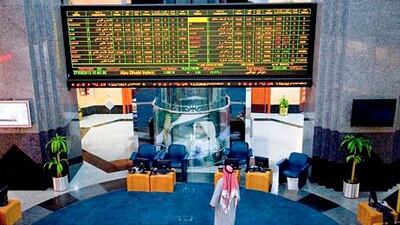EFG-Hermes will shut its brokerage at the Abu Dhabi Securities Exchange by the end of the month in an effort to reduce costs, it said yesterday.
The Egyptian investment bank will instead cater to its institutional clients from its headquarters in Dubai amid dwindling demand in the UAE for buying and selling shares among the public.
"We submitted our intention, but we are still working on the operational issues with the stock market and our clients - informing them that we are no longer operating out of Abu Dhabi," said Mohamed Ebeid, the co-head of brokerage at EFG-Hermes in Cairo.
The booths of the Abu Dhabi exchange once buzzed with the urgent chatter of brokers as traders launched their buy and sell orders via paper aeroplanes over the heads of rivals jamming the trading room's floor.
"Today everything is being done remotely. It used to be that you had to have a physical presence because investors would swarm around the offices and brokers traded on orders," Mr Obeid said. "But the culture of trading changed in the last five or six years, mainly because of the correction that happened as a result of the global financial crisis."
Many of those trading booths stood empty yesterday morning, some with the lights off.
Today, only 50 licensed brokerages are operating in the Emirates, down from 110 almost two years ago.
"There has been a restructuring of the traded value rankings by brokerage houses. Previously the top 10 were dominated by banks," said Nabil Farhat, a partner at Al Fajer Securities. "Now we are seeing stand-alone brokerages in the top 10."
Al Fajer Securities, a private brokerage based in Abu Dhabi, ranks sixth in terms of traded value for the month of December. EFG Hermes ranks third.
"That is being helped through a rise of commission from volumes coupled with an increase in the brokerages' investment portfolio helped by higher stock prices and cost cutting," Mr Farhat said.
EFG's restructuring effort includes the elimination of seven positions across the UAE.
EFG's local brokerage lost Dh330,982 (US$90,112) in the third quarter, deepening a loss of Dh50,193 in the same period last year.
Trading volumes have reached Dh69.4 billion for Abu Dhabi and Dubai combined this year, an increase compared to last year's Dh57bn figure, but still below the Dh103bn of 2010.
The volume might not be there but the performance is: the ADX General Index has risen almost 10 per cent this year, while the Dubai Financial Market General Index has advanced about 18 per cent in the same period.
The new headquarters of the ADX, valued by Mubadala Development, a strategic investment company owned by the Abu Dhabi Government, at Dh4bn, is nearing completion on Sowwah Island.
Asked whether EFG would like to have a presence in Abu Dhabi's new financial hub, Mr Ebeid said, "We would be interested if at such time, the market volumes justifies being there".
Many foreign investment banks restructured their operations in the UAE last year to cope with falling volumes.
Germany's Deutsche Bank moved its head of equity capital markets back to London from Dubai. Nomura, based in Tokyo, closed its Dubai equity research unit, and HSBC shut its retail brokerage unit in the Emirates.

